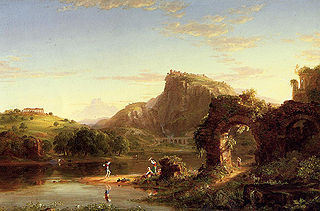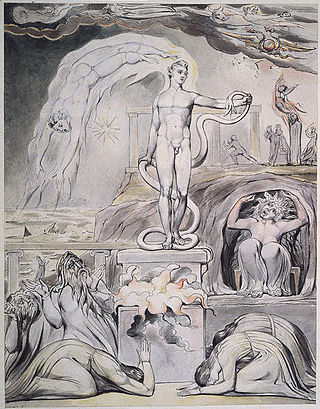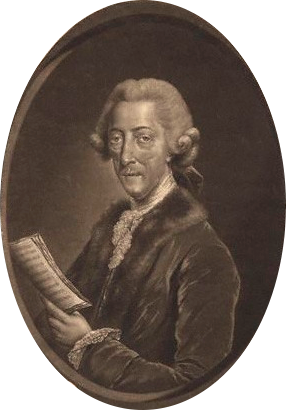Related Research Articles

John Milton was an English poet and intellectual. His 1667 epic poem Paradise Lost, written in blank verse and including over ten chapters, was written in a time of immense religious flux and political upheaval. It addressed the fall of man, including the temptation of Adam and Eve by the fallen angel Satan and God's expulsion of them from the Garden of Eden. Paradise Lost elevated Milton's reputation as one of history's greatest poets. He also served as a civil servant for the Commonwealth of England under its Council of State and later under Oliver Cromwell.

The masque was a form of festive courtly entertainment that flourished in 16th- and early 17th-century Europe, though it was developed earlier in Italy, in forms including the intermedio. A masque involved music, dancing, singing and acting, within an elaborate stage design, in which the architectural framing and costumes might be designed by a renowned architect, to present a deferential allegory flattering to the patron. Professional actors and musicians were hired for the speaking and singing parts. Masquers who did not speak or sing were often courtiers: the English queen Anne of Denmark frequently danced with her ladies in masques between 1603 and 1611, and Henry VIII and Charles I of England performed in the masques at their courts. In the tradition of masque, Louis XIV of France danced in ballets at Versailles with music by Jean-Baptiste Lully.

Henry Lawes was the leading English songwriter of the mid-17th century. He was elder brother of fellow composer William Lawes.

Samson Agonistes is a tragic closet drama by John Milton. It appeared with the publication of Milton's Paradise Regained in 1671, as the title page of that volume states: "Paradise Regained / A Poem / In IV Books / To Which Is Added / Samson Agonistes". It is generally thought that Samson Agonistes was begun around the same time as Paradise Regained but was completed after the larger work, possibly very close to the date of publishing, but there is no certainty.

Emilia Lanier, néeAemilia Bassano, was an English poet and the first woman in England to assert herself as a professional poet, through her volume Salve Deus Rex Judaeorum. Attempts have been made to equate her with Shakespeare's "Dark Lady".
Arcade most often refers to:

Il Penseroso is a poem by John Milton, first found in the 1645/1646 quarto of verses The Poems of Mr. John Milton, both English and Latin, published by Humphrey Moseley. It was presented as a companion piece to L'Allegro, a vision of poetic mirth. The speaker of this reflective ode dispels "vain deluding Joys" from his mind in a ten-line prelude, before invoking "divinest Melancholy" to inspire his future verses. The melancholic mood is idealised by the speaker as a means by which to "attain / To something like prophetic strain," and for the central action of Il Penseroso – which, like L'Allegro, proceeds in couplets of iambic tetrameter – the speaker speculates about the poetic inspiration that would transpire if the imagined goddess of Melancholy he invokes were his Muse. The highly digressive style Milton employs in L'Allegro and Il Penseroso dually precludes any summary of the poems' dramatic action as it renders them interpretively ambiguous to critics. However, it can surely be said that the vision of poetic inspiration offered by the speaker of Il Penseroso is an allegorical exploration of a contemplative paradigm of poetic genre.
Rachel Speght was a poet and polemicist. She was the first Englishwoman to identify herself, by name, as a polemicist and critic of gender ideology. Speght, a feminist and a Calvinist, is perhaps best known for her tract A Mouzell for Melastomus. It is a prose refutation of Joseph Swetnam's misogynistic tract, The Arraignment of Lewd, Idle, Froward, and Unconstant Women, and a significant contribution to the Protestant discourse of biblical exegesis, defending women's nature and the worth of womankind. Speght also published a volume of poetry, Mortalities Memorandum with a Dreame Prefixed, a Christian reflection on death and a defence of the education of women.
To "trip the light fantastic" is to dance nimbly or lightly to music. The origin of the phrase is attributed to John Milton.

Comus is a masque in honour of chastity written by John Milton. It was first presented on Michaelmas 1634 before John Egerton, 1st Earl of Bridgewater at Ludlow Castle in celebration of the Earl's new post as Lord President of Wales.

L'Allegro is a pastoral poem by John Milton published in his 1645 Poems. L'Allegro has from its first appearance been paired with the contrasting pastoral poem, Il Penseroso, which depicts a similar day spent in contemplation and thought.
Tempe Restored was a Caroline era masque, written by Aurelian Townshend and designed by Inigo Jones, and performed at Whitehall Palace on Shrove Tuesday, 14 February 1632. It was significant as an early instance in which a woman appeared in a speaking role in a public stage performance in England.
The Reason of Church-Government Urged against Prelaty is an essay by English poet John Milton distributed as one of a series of religious pamphlets by the writer. Published in 1642, the political work details Milton's preference for a Presbyterian approach to the Church of England over approaches favoured by the episcopal organization of the time. Milton states that this form of worship stems from Hebrew scriptures. The essay was meant as a response to the beliefs of Bishop Joseph Hall and Archbishop James Ussher.

On the Morning of Christ's Nativity is a nativity ode written by John Milton in 1629 and published in his Poems of Mr. John Milton (1645). The poem describes Christ's Incarnation and his overthrow of earthly and pagan powers. The poem also connects the Incarnation with Christ's Crucifixion.
The Passion is an unfinished ode by John Milton that was possibly written in 1630 and was first published in 1645 or 1646. The poem connects Christ's Crucifixion with his Incarnation. It is linked to two other poems of Milton: On the Morning of Christ's Nativity and Upon the Circumcision

John Milton wrote poetry during the English Renaissance. He was born on 9 December 1608 to John and Sara Milton. Only three of their children survived infancy. Anne was the oldest, John was the middle child, and Christopher was the youngest.

Comus is a masque in three acts by English composer Thomas Arne. The work uses a libretto by John Dalton (1709-1763) that is based on John Milton's 1634 masque of the same name. The work was first performed at the Theatre Royal, Drury Lane, London, on 4 March 1738.

Alice Spencer, Countess of Derby was an English noblewoman from the Spencer family and noted patron of the arts. Poet Edmund Spenser represented her as "Amaryllis" in his eclogue Colin Clouts Come Home Againe (1595) and dedicated his poem The Teares of the Muses (1591) to her.

Alice Vaughan, Countess of Carbery (1619-1689), known before her marriage as Alice Egerton, was the daughter of John Egerton, 1st Earl of Bridgewater. She was a musician and performer who acted in two notable masques: Aurelian Townshend's Tempe Restored (1632), and John Milton's Maske Performed at Ludlow Castle (1634).

Frances Egerton, Countess of Bridgewater, formerly Lady Frances Stanley, was an English art patron and book collector.
References
- Carey, John. "Milton's Harmonious Sisters" in The Well Enchanting Skill. Ed. John Caldwell, Edward Olleson, and Susan Wollenberg. Oxford: Clarendon Press, 1990.
- Lewalski, Barbara. "Genre" in A Companion to Milton. Ed. Thomas Corns. Oxford: Blackwell Publishing, 2003.
- Revard, Stella. Milton and the Tangles of Neaera's Hair. Columbia: University of Missouri Press, 1997.
- Shawcross, John. John Milton: The Self and the World. Lexington: University Press of Kentucky, 1993.
